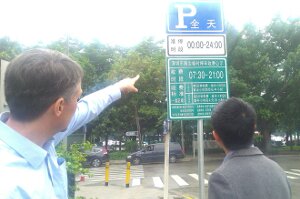 Uncontrolled and illegal parking is facing increasing discomfort by local authorities in the city of Shenzhen. An annually rising car ownership of 15%, increasing congestion, and an average speed of 26 km/h on inner urban streets in 2013 affirmed Shenzhen Municipal Commission of Transport to take action. To “clean up” Shenzhen’s roads and not further reduce capacity of streets local authorities announced the introduction of parking management policy consisting of two parts: an on-street and an off-street parking fee. The new parking policy will become effective on July 1st, 2014. For the first implementation phase four pilot areas were selected representing a mix of residential, business and commercial areas – so called Type 1 Areas.
Uncontrolled and illegal parking is facing increasing discomfort by local authorities in the city of Shenzhen. An annually rising car ownership of 15%, increasing congestion, and an average speed of 26 km/h on inner urban streets in 2013 affirmed Shenzhen Municipal Commission of Transport to take action. To “clean up” Shenzhen’s roads and not further reduce capacity of streets local authorities announced the introduction of parking management policy consisting of two parts: an on-street and an off-street parking fee. The new parking policy will become effective on July 1st, 2014. For the first implementation phase four pilot areas were selected representing a mix of residential, business and commercial areas – so called Type 1 Areas.
a) In a first step, an on-street parking fee of 5 CNY for the first 30 minutes and an additionally 10 CNY for every following 30 minutes will be levied during most hours of the day (from 7am to 21:30pm). Further areas across the city will be included in the charging system if the system will be successful.
b) In a second step, the introduction of a so called off-street adjustment fee is planned within the policy framework. The idea requests car park operators to charge a base fee of 30 CNY independent of their individual parking fee and pass on the collected fee to the respective local authority. This suggested base fee will be discussed and adapted in the coming month.
Compared to other Chinese cities Shenzhen did not implement a policy that limits vehicle ownership. Instead, local authorities induce high parking cost to reduce car usage. Against the background of a more market-oriented transport demand management in Shenzhen, GIZ invited Paul Barter, a transport policy advisor from Singapore, to present experiences with parking policies in Asian city and to support local authorities in the planning process in Shenzhen. After a first visit in autumn 2013 last week Paul Barter discussed details of the upcoming parking charge with the Shenzhen Urban Transport Planning Centre in a follow-up visit. The discussion focused on evaluating the impact and effectiveness of the new parking management policy. The project group was particularly interested in the impact on traffic flow, the economic and environmental evaluation as well as social acceptance. Measuring impacts enables local authorities to adjust the policy and to evaluate contributions to reducing congestion levels and air pollution. Paul Barter was invited to give feedback on presented ideas and discuss additional ideas. Suggestions concerning potential pricing for off-street parking and its revenue management were also made.
In the next months the GIZ project will continue to support local authorities in the implementation and environmental evaluation of the new parking policy to acquire practical experience and derive learnings for other Chinese cities interested in introducing an urban parking policy. In this context, Shenzhen will also apply the GIZ supported HBEFA emission model to quantify impacts of transport demand management strategies in Chinese cities.




Comments are closed.